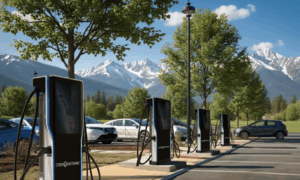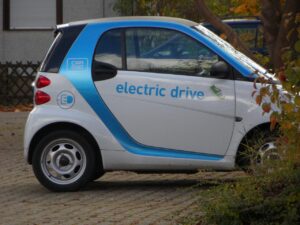
Home / EV Charging News / Smart EV Chargers: Benefits for Deployment and the Grid
The rapid adoption of electric vehicles (EVs) has led to a growing demand for efficient and sustainable charging solutions. Among these, smart EV chargers have emerged as a key technology in managing the increasing load on the grid while offering benefits to both consumers and energy providers. Smart chargers not only optimize the charging process but also integrate advanced technologies that support grid stability and energy efficiency. In this article, we will explore the key benefits of smart EV chargers, their role in grid management, and how they are transforming the future of EV charging infrastructure.
Smart EV chargers are charging devices equipped with advanced technology that allows them to communicate with the grid, monitor energy usage, and adapt to fluctuating energy demands. Unlike traditional chargers, smart chargers can manage the charging process more dynamically, providing benefits such as cost savings, efficient energy use, and support for renewable energy sources. These chargers are designed to optimize charging schedules, integrate with home energy management systems, and even participate in grid balancing efforts.
Smart EV chargers provide significant advantages for consumers by offering more control over the charging process, allowing them to schedule charging during off-peak hours to save on energy costs. These chargers also enhance convenience by enabling remote monitoring and management of charging sessions through mobile apps, making it easier to integrate EV charging into daily routines.
One of the primary advantages of smart EV chargers for consumers is cost efficiency. By allowing users to schedule charging during off-peak hours when electricity rates are lower, smart chargers help reduce energy costs. Some smart chargers can automatically adjust charging times based on real-time electricity pricing, ensuring that consumers always pay the lowest possible rates.
Smart EV chargers offer unparalleled convenience, allowing users to control and monitor charging sessions remotely through smartphone apps. Whether at home or away, users can start, stop, or adjust the charging process with just a few taps. Additionally, many smart chargers provide notifications when charging is complete, ensuring that users are always informed about the status of their vehicle.
As the world shifts toward renewable energy sources, smart chargers play a crucial role in supporting this transition. These chargers can integrate with solar panels or wind turbines, allowing EV owners to charge their vehicles using clean, sustainable energy. This not only reduces the carbon footprint of the vehicle but also maximizes the use of locally generated renewable energy.
For grid operators, smart EV chargers help balance electricity demand by distributing charging loads more evenly throughout the day, preventing overloads during peak periods. Additionally, features like Vehicle-to-Grid (V2G) technology enable EVs to act as mobile energy storage units, feeding power back into the grid during high-demand periods and enhancing grid stability.
One of the most significant benefits of smart EV chargers is their ability to support grid load balancing. As more EVs come online, the demand for electricity is expected to surge, potentially leading to strain on the grid during peak times. Smart chargers help alleviate this pressure by distributing charging loads more evenly throughout the day.
Smart EV chargers contribute to environmental sustainability by optimizing energy use and supporting the integration of renewable energy sources such as solar and wind. By enabling EVs to charge when green energy is abundant, these chargers help reduce the carbon footprint of transportation and promote the transition to a low-emission energy system.
Smart EV chargers contribute to reducing the overall carbon footprint of electric vehicles. By optimizing energy use and integrating with renewable energy sources, these chargers ensure that EVs are charged using the cleanest possible electricity. This reduces the dependency on fossil fuels and helps accelerate the transition to a low-carbon energy system.
As governments and organizations worldwide set ambitious energy efficiency goals, smart chargers are becoming an essential tool in achieving these targets. Their ability to manage energy demand more effectively, minimize energy waste, and support the integration of clean energy makes them a key component of broader sustainability initiatives. By deploying smart chargers on a large scale, countries can make significant progress toward reducing energy consumption and achieving net-zero emissions.
Deploying smart EV chargers requires substantial investment in infrastructure, including upgrading the grid and ensuring compatibility with various EV models. Public-private partnerships, consumer education, and government incentives are essential to accelerate the adoption of smart charging technology and ensure that it is accessible and affordable for all users.
Deploying smart EV chargers requires significant investment in both infrastructure and technology. This includes the installation of charging stations, upgrading grid capacity, and ensuring compatibility with various types of EVs. Governments and private sector stakeholders must work together to provide the necessary funding and incentives to accelerate the deployment of smart chargers.
Public-private partnerships are crucial in the successful deployment of smart EV chargers. Governments can offer incentives, tax breaks, or subsidies to encourage the installation of smart charging stations, while private companies can provide the technological expertise and resources needed for large-scale implementation. Collaboration between energy providers, automakers, and technology firms will ensure that smart chargers are accessible and affordable for all EV owners.
For smart EV chargers to be fully effective, consumers need to be educated about their benefits and how to use them efficiently. Many EV owners may not be aware of the cost savings or environmental advantages associated with smart charging, so it is important for governments and companies to invest in public awareness campaigns. Clear, easy-to-understand information on how to optimize charging sessions and take advantage of off-peak rates will help consumers get the most out of their smart chargers.
As the adoption of electric vehicles continues to grow, the role of smart EV chargers will become increasingly important. These chargers not only provide benefits for consumers and grid operators but also support broader sustainability and energy efficiency goals. By facilitating the integration of renewable energy and enabling technologies like V2G, smart chargers are paving the way for a cleaner, more resilient energy future. The deployment of smart EV chargers will play a key role in the modernization of the grid, ensuring that it can handle the growing demand for electric vehicles while maintaining stability and reliability.
Smart EV chargers are transforming the way we think about electric vehicle charging and grid management. From cost savings and convenience for consumers to grid balancing and renewable energy integration for operators, the benefits are clear. As the world moves toward a cleaner, more sustainable energy system, the deployment of smart EV chargers will be critical in meeting the needs of both EV drivers and the energy grid. By investing in this technology now, we can ensure a future where electric vehicles and the grid work together in harmony.



